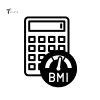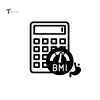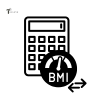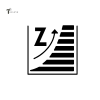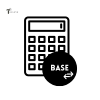Waist-Hip Ratio Calculator
Measure your body shape and associated health risks
Waist-to-Hip Ratio Calculator: Check Your Health Risk Instantly
Your waist-to-hip ratio (WHR) is a crucial health marker—more revealing than BMI alone. Our free waist hip ratio calculator gives you instant results, helping you detect dangerous belly fat (excesso hip) before it becomes a serious problem.
 How to Use Our Waist-to-Hip Ratio Calculator
How to Use Our Waist-to-Hip Ratio Calculator
Using our tool is simple:
Step 1: Wrap a measuring tape around your waist (narrowest part, usually above the belly button).
Step 2: Measure your hips at the widest point (around your buttocks).
Step 3: Enter both numbers into our calculator.
Step 4: Get your WHR score and health assessment instantly!

OTHER TOOLS 📊 What Your Waist-to-Hip Ratio Means
A healthy WHR varies by gender:
For men: Below 0.9 is ideal. Above 1.0 signals high risk.
For women: Below 0.85 is best. Over 0.9 indicates danger.
Why it matters:
A high WHR means excess belly fat, linked to heart disease and diabetes.
Unlike BMI, WHR shows where fat is stored—not just total weight.
It’s a better predictor of health risks than the ideal body weight formula.
⚠️ Health Dangers of a High WHR
If your WHR is too high, you may face:
Higher heart disease risk (up to 34% more likely).
Increased chance of type 2 diabetes.
Greater risk of stroke and some cancers.
Did you know? Even people with a “normal” BMI can have dangerous WHR levels if they carry belly fat.
ALSO CHECK  How to Improve Your Waist-to-Hip Ratio
How to Improve Your Waist-to-Hip Ratio
Lowering your WHR means shrinking belly fat. Try these proven methods:
Cardio workouts (walking, cycling, swimming) – Burns visceral fat fastest.
Strength training – Builds muscle and tightens the waistline.
Cut sugar & refined carbs – Stops fat storage around organs.
Manage stress – High cortisol = more belly fat.


 Frequently Asked Questions
Frequently Asked Questions
Q: Is WHR better than BMI?
A: Yes! BMI only checks weight vs. height, while WHR reveals dangerous belly fat—even in slim people.
Q: Can muscle affect WHR results?
A: Yes, extremely muscular people may have a high WHR without extra fat.
Q: How often should I check my WHR?
A: Measure every 4-6 weeks to track fat loss progress.
Q: What’s the best way to measure waist & hips?
A: Use a flexible tape measure, breathe normally, and don’t suck in your stomach.

